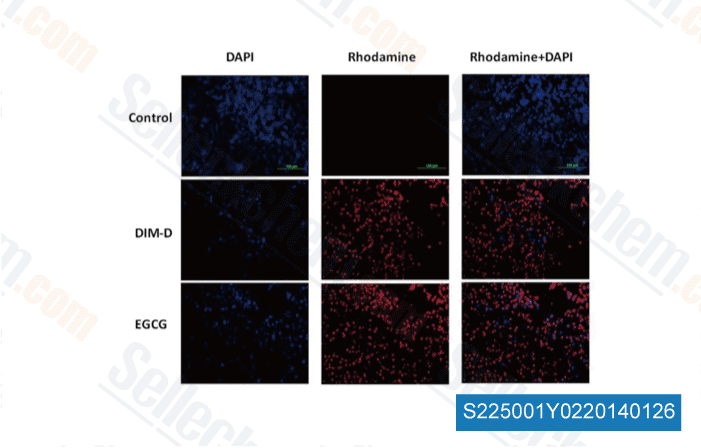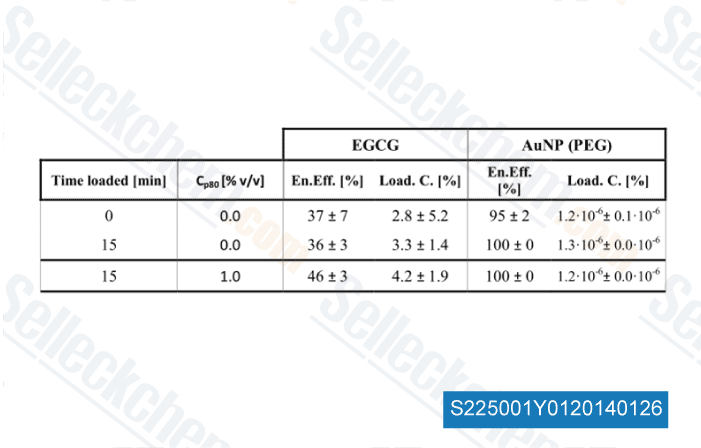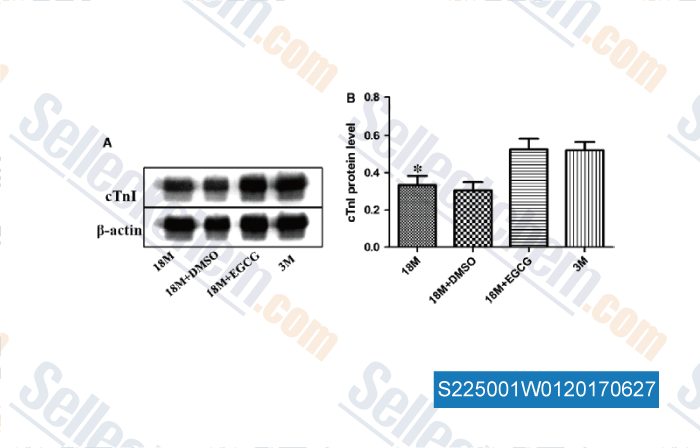|
Toll Free: (877) 796-6397 -- USA and Canada only -- |
Fax: +1-832-582-8590 Orders: +1-832-582-8158 |
Tech Support: +1-832-582-8158 Ext:3 Please provide your Order Number in the email. |
Technical Data
| Formula | C22H18O11 |
|||
| Molecular Weight | 458.37 | CAS No. | 989-51-5 | |
| Solubility (25°C)* | In vitro | DMSO | 92 mg/mL (200.71 mM) | |
| Water | 92 mg/mL (200.71 mM) | |||
| Ethanol | 92 mg/mL (200.71 mM) | |||
|
* <1 mg/ml means slightly soluble or insoluble. * Please note that Selleck tests the solubility of all compounds in-house, and the actual solubility may differ slightly from published values. This is normal and is due to slight batch-to-batch variations. * Room temperature shipping (Stability testing shows this product can be shipped without any cooling measures.) |
||||
Preparing Stock Solutions
Biological Activity
| Description | EGCG ((-)-Epigallocatechin Gallate) is the main catechin extraction of green tea that inhibits telomerase and DNA methyltransferase. EGCG blocks the activation of EGF receptors and HER-2 receptors. ECGG inhibits fatty acid synthase and glutamate dehydrogenase activity. | |||||
|---|---|---|---|---|---|---|
| Targets |
|
|||||
| In vitro | (-)-Epigallocatechin gallate functions as a powerful antioxidant, preventing oxidative damage in healthy cells, but also as an antiangiogenic and antitumor agent and as a modulator of tumor cell response to chemotherapy. (-)-Epigallocatechin gallate shows multiple anticancer effects, such as anti-proliferation, anti-angiogenesis, transformation prevention of various cancer cells, cancer cell cycle arrest and inhibition of tumor metastasis. (-)-Epigallocatechin gallate exerts multi-anticancer effects through regulating several cancer-related cell signal pathways (regulated the function or the expression of key signal proteins, such as nuclear factor-κB, MAPKs and activator protein-1, EGFR, IGF, COX-2 signaling pathway, and so on.), effecting methylation of cancer genes and combination of ligand with membrane receptors. [1] (-)-Epigallocatechin gallate also shows an immunomodulating effects. Several types of immune cells in both the innate and adaptive immune systems are known to be affected in varying degrees by (-)-Epigallocatechin gallate. Among them, the dramatic effect on T cell functions has been repeatedly demonstrated, including T cell activation, proliferation, differentiation, and production of cytokines. Studies using animal models of autoimmune diseases have reported disease improvement in animals treated with green tea/EGCG. [2] (-)-Epigallocatechin gallate displays anti-infective properties. Antiviral activities of (-)-Epigallocatechin gallate with different modes of action have been demonstrated on diverse families of viruses, such as Retroviridae, Orthomyxoviridae and Flaviviridae and include important human pathogens like human immunodeficiency virus, influenza A virus and the hepatitis C virus. [3] |
Protocol (from reference)
References
Customer Product Validation

-
Data from [PLoS One, 2013, 8(8), e69519]

-
Data from [PLoS One, 2013, 8(8), e69519]

-
, , J Cell Mol Med, 2017, 21(10):2481-2490
-Epigallocatechin-Gallate-S225001Y0120170210.gif)
-
Data from [Data independently produced by , , Sci Rep, 2016, 6:27268.]
Selleck's EGCG ((-)-Epigallocatechin Gallate) has been cited by 43 publications
| GDH1-dependent α-ketoglutarate promotes HBV transcription by modulating histone methylations on the cccDNA minichromosome [ Clin Mol Hepatol, 2025, 10.3350/cmh.2024.0694] | PubMed: 39905842 |
| The SAR analysis of dietary polyphenols and their antagonistic effects on bortezomib at physiological concentrations [ Front Pharmacol, 2024, 15:1403424] | PubMed: 39119616 |
| Structure-based virtual screening of natural compounds in preventing skin senescence: The role of epigallocatechin gallate in protein kinase C alpha-specific inhibition against UV-induced photoaging [ Heliyon, 2024, 10(21):e39933] | PubMed: 39553571 |
| Epigallocatechin-3-gallate induces immunogenic cell death and enhances cancer immunotherapy in colorectal cancer [ Biochem Biophys Res Commun, 2024, 736:150907] | PubMed: 39471680 |
| Tea polyphenol EGC suppresses colorectal cancer cell proliferation both in vitro and in vivo via downregulation of STAT3 [ Journal of Functional Foods, 2024, 105977] | PubMed: none |
| Dysregulated Gln-Glu-α-ketoglutarate axis impairs maternal decidualization and increases the risk of recurrent spontaneous miscarriage [ Cell Rep Med, 2023, 4(5):101026] | PubMed: 37137303 |
| Connexin43 is associated with the progression of clear cell renal carcinoma and is regulated by tangeretin to sygergize with tyrosine kinase inhibitors [ Transl Oncol, 2023, 35:101712] | PubMed: 37354638 |
| Molecular Signature Predictive of Long-Term Liver Fibrosis Progression to Inform Antifibrotic Drug Development [ Gastroenterology, 2022, 162(4):1210-1225] | PubMed: 34951993 |
| EGFR-phosphorylated GDH1 harmonizes with RSK2 to drive CREB activation and tumor metastasis in EGFR-activated lung cancer [ Cell Rep, 2022, 41(11):111827] | PubMed: 36516759 |
| EGCG prevents pressure overload‑induced myocardial remodeling by downregulating overexpression of HDAC5 in mice [ Int J Mol Med, 2022, 49(1)11] | PubMed: 34841436 |
RETURN POLICY
Selleck Chemical’s Unconditional Return Policy ensures a smooth online shopping experience for our customers. If you are in any way unsatisfied with your purchase, you may return any item(s) within 7 days of receiving it. In the event of product quality issues, either protocol related or product related problems, you may return any item(s) within 365 days from the original purchase date. Please follow the instructions below when returning products.
SHIPPING AND STORAGE
Selleck products are transported at room temperature. If you receive the product at room temperature, please rest assured, the Selleck Quality Inspection Department has conducted experiments to verify that the normal temperature placement of one month will not affect the biological activity of powder products. After collecting, please store the product according to the requirements described in the datasheet. Most Selleck products are stable under the recommended conditions.
NOT FOR HUMAN, VETERINARY DIAGNOSTIC OR THERAPEUTIC USE.
